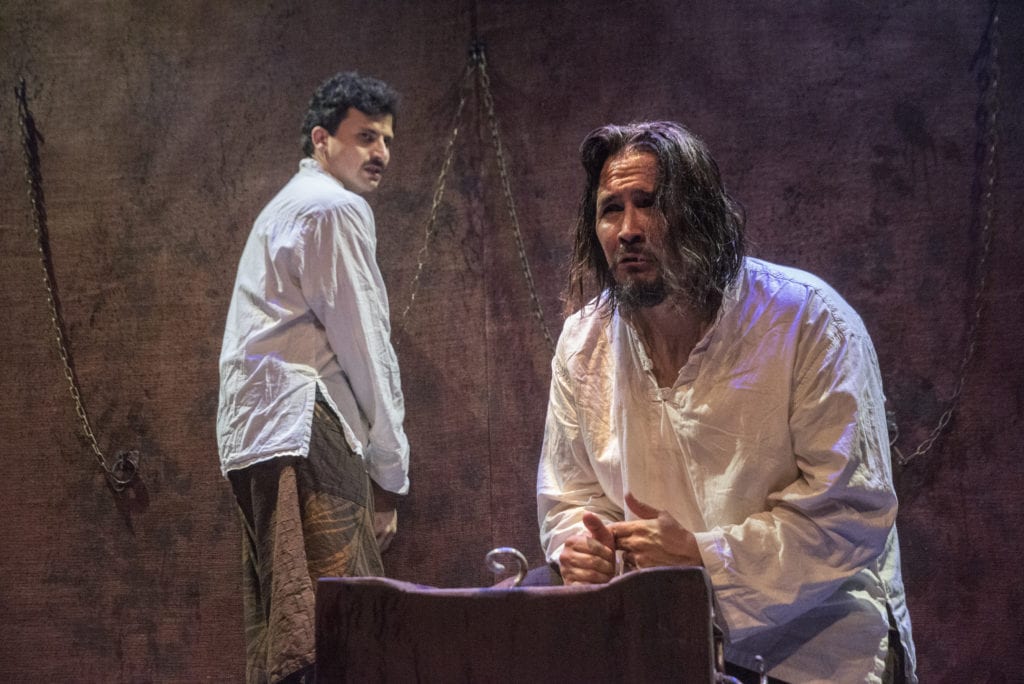
Guards at the Taj
By Bob Bows (Read the original.)
Generally considered to be one of the most beautiful buildings in the world, if not the most beautiful, the Taj Mahal is naturally shrouded in myths, one of which the noted playwright, Rajiv Joseph (2010 Pulitzer finalist for Bengal Tiger at the Baghdad Zoo), amplifies into a metaphor so pregnant with meaning that we stand in awe of its beauty, just as we do for the architecture that inspired it.
Whether the particular myth that is the through line in this story was derived from actual facts, or whether it was conjured as fiction, has apparently been lost to history and the censorship of those in power; so, in this case, we will not chide the playwright for changing history and mis-educating people in the name of “drama,” because the records available to us are strangely thin, and the tourist industry at the site of this monument, in Agra, India, is a lucrative business (much like the town of Stratford-on-Avon has for a grain speculator who was unfamiliar with writing his own name. But in the latter case, we have plenty of facts regarding the actual author, so we hold those writing about Shake-speare to a different standard).
Thus, in this particular cyber realm, the “royal we” grants poetic license to the author of this tale, with reverence, in contrast to the intent of Shah Jahan, the great-great-grandson of Babur, First Mughal Emperor (via Afghanistan), whose decrees—regarding those who would prematurely gaze upon this masoleum for his favorite wife, and those who designed and built it for him—were intended to harm, for purely selfish purposes. Suffice it to say, a fate closely related to those who worked on the Taj Mahal was also earlier assigned to those who designed and built another set of masoleums—the Great Pyramids.
Humayun (Sam Gilstrap) and Babur (Jihad Milhem) are “Imperial Guards of the Great Walled City of Agra, Sworn to the Eternal Dominion of his Most Supreme Benevolence Emperor Shah Jahan.” Humayun takes his position very seriously, following all the rules, in the footsteps of his father, who is a high-ranking officer in the guard. In Gilstrap’s endearing portrait of this loyal subject, with a tug-of-war within himself, between his heart and his ego, we see an inkling of why, 200 years after this story takes place, the stiff upper lip of the British Raj took root so transparently in the Indian military, despite the bloody imposition of new imperial power.
On the other hand, Milhem’s ownership of Babur’s iconoclastic glee, as he pokes holes in Humayun’s carefully constructed world, is a delightful example of heart and ego working in concert. We see this same playfulness in the unique writers (e.g., Salman Rushdie) that leverage the Indian dialect of British English. There is also a bit of the classical fool in Babur, as he speaks “inconvenient truths.”
Joseph’s script is a marvel of intellectual and dramatic fluidity, establishing the long-time camaradarie of Humayun and Babur, presenting the cultural context for the construction of the Taj Mahal, offering a sublime meditation on beauty and art, and providing a remarkable metaphorical opportunity, in our minds, between the bloody deeds of these guards, and their reward of an assignment in the Emperor’s harem, with the present-day promises of heavenly virgins to Islamic warriors who give their life for the cause (e.g., suicide bombers). The Moghul Empire brought Islam to India, which was predominantly Hindu, and ruled as a minority, among the “infidels.” Of course, such notions of religious dogma and duty are not far from the twin imperial marketing weapons of Christianity and patriotism in Europe and North America.
Director Stephen Weitz and his designers gift us with a beautiful production: Ron Mueller’s set is elegant and flexible; Katie Horney’s costumes span the range of a soldier’s life, from ceremonial to menial; Jacob Welch’s lighting deftly enhances the mood; Daniel Horney’s sound design is a subtle, subtextual mirror of the action; the physical struggles between the protagonists are expertly choreographed by Benaiah Anderson; and Anneke Ciup’s special effects are visceral and stunning.
